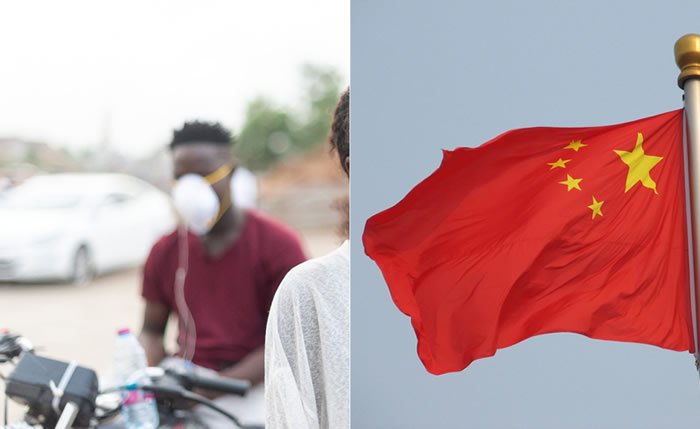
Tall, stately and clad in brightly colored fabrics that stand out against the arid landscape, the women at a U.N. food distribution site in Jonglei state, South Sudan, wait patiently in line in the stifling heat to receive their monthly rations.
“My life changed since [South Sudan’s 2011] independence. Now I’m getting aid – things are better,” Rebecca Akeer, aged in her 50s, said outside her simple mud hut as aid workers handed out large sacks of grains.
But Akeer and others in a war-torn African nation could soon see the knock-on effects of a distant European war, with analysts wondering if China can dampen the anticipated impact that international sanctions against Russia will have on the African continent.
Food insecurity
The conflict in Ukraine and resulting sanctions on Russia are driving up global oil and food prices, which could lead to increased hunger in Africa, and even more unrest, analysts said.
“We are heading for a disruption,” said Steven Gruzd, a Russia expert and foreign policy analyst at the South Africa Institute of International Affairs in Johannesburg.
“The price of bread is going to go up. It sometimes brings people into the streets,” he added, noting that the revolution in neighboring Sudan basically began as a 2018 bread riot.
“I think food insecurity will be a massive consequence of this war.”
Russia is the world’s largest exporter of wheat, and Ukraine ranks fifth. Countries in North Africa, such as Egypt, Russia’s top Africa trade partner, are expected to especially feel the impact of the sanctions. Tunisia has said it is already looking elsewhere for wheat supplies.
“When looking at the impact of the conflict in Ukraine on global food security, in a year of unprecedented humanitarian needs, WFP is extremely concerned as the conflict may have far-reaching consequences,” Claudio Altorio, a World Food Program spokesperson, told VOA.
Russian activity under President Vladimir Putin expanded rapidly in Africa over the past decade. Facing sanctions from the European Union, Vladimir Padalko, vice president of the Russian Chamber of Commerce and Industry, said Moscow planned to expand its trade missions to Africa as an alternative for products such as fruit, tea and coffee, according to the Russian state news agency Tass.
Russia has engaged with chronically unstable nations like Mali and the Central African Republic, where it has mineral interests, and where private, Russia-based military contractors are stationed. China, on the other hand, is engaged across the continent through loans and infrastructure investment.
In 2021, total bilateral trade between China and Africa reached $254.3 billion, Chinese authorities said. By contrast, Russia-Africa trade was worth about $20 billion, according to the African Export-Import Bank.
“The magnitude of China’s trade with Africa is already 10 or more times bigger than Russia’s trade with Africa,” said Gruzd. “If supply lines go down, China would probably be best placed to pick up that slack.”
Cobus van Staden, senior China-Africa researcher at the South African Institute of International Affairs, sees potential benefits for Africa’s top exporting nations as well.
“African countries are in general trying to increase their agricultural exports to China. South Africa exports a lot to China and Russia … so South African companies may be looking to China to make up for disruptions,” he said.
But Wandile Sihlobo, chief economist at the Agricultural Business Chamber of South Africa, said he didn’t think sanctions on Russia would increase China-Africa trade. He said he thought the European Union, the United States and Canada would be better placed to supply Africa with grains and, to some extent, oil.
“China doesn’t really have the supply of products like oil and grains that African countries actually need. … Even though it’s amongst the major grain producers, they produce much for their own consumption,” he said.
China has had a particularly bad growing season. Last week, China’s agriculture minister said the winter wheat crop could be “the worst in history.” Prices have already skyrocketed because of the Ukraine crisis.
African energy
While food insecurity will hurt ordinary Africans the most, the coffers of some oil-rich African states are likely to benefit from disruptions to Russian oil and gas.
“The oil producers [in Africa] in the short term could have a bit of a boom,” Gruzd said.
Van Staden said that boom could be even greater if China cooperated with international sanctions against Russia, something that has yet to happen.
“If it’s a situation where they [China] do manage to block Russian oil and gas exports, oil and gas producers in Africa may have some short-term benefits,” he said, adding, “You could see China buying more oil from Angola, and there’s a series of natural gas projects starting to come on-line in Tanzania.”
“For the Chinese, they’re such a huge economy that diversifying their sources for commodities is a strategy for them anyway,” said van Staden. “This is kind of why China started the Belt and Road Initiative.”
Shifting alliances
Before the fall of the Soviet Union, many African nations were seen as either under Washington’s or Moscow’s sphere of influence, a divide some analysts believe could be revived by the war in Ukraine.
“The areas of risk I see are that African governments may feel compelled to ‘choose a side’ in a new Cold War situation,” said Yunnan Chen, a doctoral candidate at the China-Africa Research Initiative at Johns Hopkins University.
“We’ve seen a big divergence on that with South Africa and BRICS [Brazil, Russia, India, China and South Africa] on the one end and Kenya on the other,” she added, referring to South Africa’s abstention from last week’s U.N. resolution that Russia withdraw from Ukraine (China also abstained).
By contrast, Kenya and Nigeria expressed support for Ukraine and condemned Moscow.
Source: voanews.com























